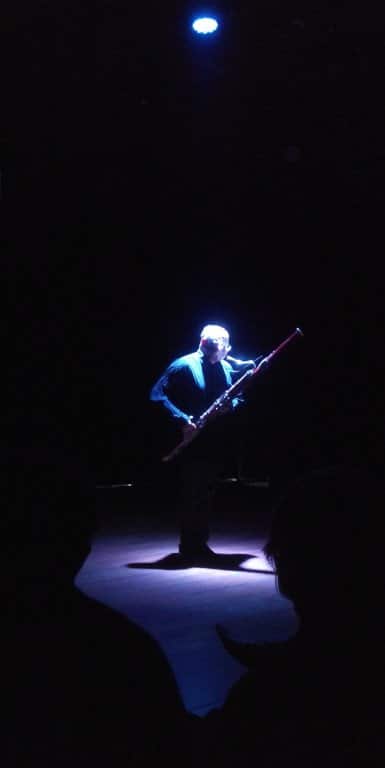Fagottist Pascal Gallois krijgt de lachers op zijn hand als hij vergeefs probeert de zojuist ontvangen bloemen in de buis van zijn instrument te steken. Ook in het inmiddels klassieke Dialogue de l’ombre double van Pierre Boulez weet hij zondag 19 juni de zaal aan het grinniken te krijgen, als hij met veel misbaar een soort olifantesk getrompetter produceert. Zijn optreden vormt onderdeel van de vorig jaar gestarte actie ‘Red de fagot’, die zondag 25 juni wordt afgesloten met een concert in de Holland Festival Proms in het Concertgebouw. Hiervoor meldden zich honderden (amateur)fagottisten aan. Actie geslaagd, dus.
Ook het puntgave en enthousiasmerende optreden van Pascal Gallois zal het imago van dit wendbare instrument beslist geen kwaad doen, ook al waren lang niet alle stoelen in het Bimhuis bezet. Hij opende met twee miniaturen van de Hongaarse componist György Kurtág, uitgevoerd in een totaal verduisterde zaal. De fagottist speelt staand met de rug naar het publiek, slechts uitgelicht door één felblauwe spot. De theatrale aanpak past wonderwel bij de twee verstilde elegieën voor de Franse dichter Gérard de Nerval en de Hongaarse componist György Kroo.
Spannend luisteravontuur
Gallois laat de voornamelijk dalende lijnen soepel vloeien, maakt de multiphonics (‘foute meerklanken’) tot een spannend luisteravontuur en maakt indruk met zijn uit het niets aanzwellende en weer in het niets oplossende tonen. Dankzij circular breathing (je ademt door je neus in en blaast tegelijkertijd met je mond het instrument aan) weet hij de vaak zeer lange lijnen zonder adempauzes uit te voeren.
Ook Torsion van Olga Neuwirth, focus componist van deze editie van het Holland Festival vergt veel circular breathing. Nog altijd staat Gallois in die blauwe zuil van licht, maar nu zijdelings naar het publiek gewend. Neuwirth laat hem alle denkbare klankkleuren verkennen, van diep ronkende bastonen en sputterende multiphonics tot ultrasnelle, door alle registers stuiterende staccatoloopjes, gierende uithalen en ‘onmogelijke’ glissandi.
Het betoog wordt doorsneden met opnames van straatrumoer die Neuwirth maakte in de vermaarde ‘voids’ van archtitect Daniel Libeskind in het Joods Museum in Berlijn. Torsion besluit met een laatste wanhoopskreet, die herinnert aan de onheilsroep van de Joodse ramshoorn.

De eveneens speciaal voor hem gecomponeerde Sequenza XII van Luciano Berio is al net zo’n klankverkenning, waarbij Gallois vaak ook met ‘valse lucht’ moet spelen. Ondanks wat virtuoos vuurwerk, benadrukt Berio met veelal lange lijnen vooral de sonore kant van de fagot. Gallois speelt zonder lessenaar en staat frontaal naar het publiek, nog altijd blauw uitgelicht. Hij buigt aan begin en einde diep, waarbij hij zijn instrument als een soort offerande ten hemel heft.
In Celluloid van de Oostenrijkse componist Johannes Maria Staud beweegt de fagottist zich langs vijf lessenaars, dit keer badend in een zee van rood licht. Hij pruttelt, snatert en snuift dat het een aard heeft, maar eindigt uiteindelijk toch op een soort grondtoon.
Trompetterende olifant
Hoogtepunt van de avond is Dialogue de l’ombre double, dat Pierre Boulez componeerde voor de zestigste verjaardag van Berio. Oorspronkelijk voor Alain Damien, de klarinettist van zijn eigen Ensemble Intercontemporain. Op verzoek van Gallois, fagottist van hetzelfde gezelschap werkte hij het om voor diens instrument. Rondom het publiek staan luidsprekers opgesteld, die door Gallois van tevoren ingespeelde partijen produceren; zelf staat hij in een tweede cirkel van zes lessenaars waarop de partijen van het twintig minuten durende stuk zijn uitgestald.
Boulez laat zich in dit stuk van zijn lichtvoetige kant zien. Gallois speelt korte loopjes en pendelende figuren, wordt ‘verrast’ door een reactie uit een of meer speakers en gaat vervolgens onverstoorbaar verder. Soms verlengen de luidsprekers zijn tonen met zacht ruisende galm, op andere momenten nemen ze het heft helemaal in handen. Het spannendst is het moment waarop razendsnelle motieven als een bezetene om ons heen gaan cirkelen en je bijna duizelig wordt van de ronddraaiende klankbeweging. Gallois lijkt op een olifant die stampend en snuivend tegenwicht probeert te bieden aan het geweld van de techniek, wanhopig trompetterend op zijn slurf.
Hoewel alle componisten het uiterste vergen van zijn techniek en uithoudingsvermogen, mist Gallois niet één noot en lijkt hij onvermoeibaar. Zijn toon is warm en loepzuiver, of smerig en ontregelend als de partituur daarom vraagt. Hij is de ideale verdediger van de fagot en bewijst en passant dat er ook bij ‘moeilijke’ nieuwe muziek wel eens wat te lachen valt.
Meer info en kaarten voor slotconcert ‘Red de fagot’ via deze link.
